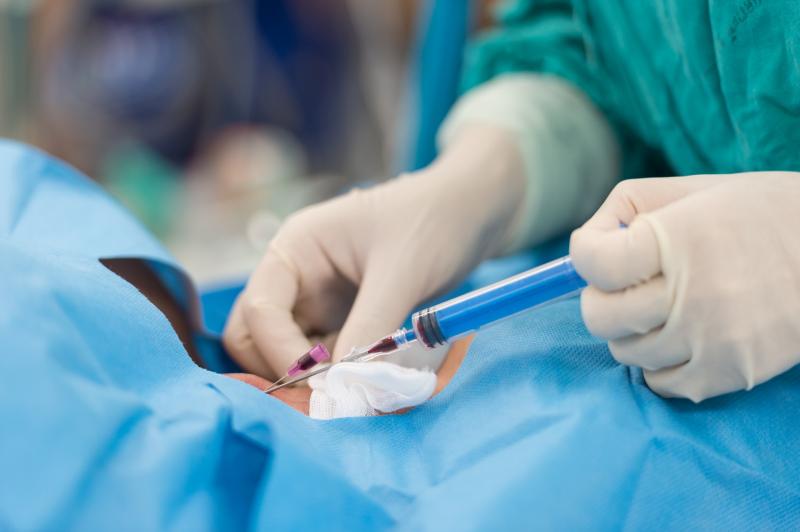
Intraoperative epidural analgesia, perioperative opioid and total dose of volatile agent appear to show some “clinically meaningful associations” with relapse-free survival (RFS) in children with solid organ tumour, particularly in paediatric sarcoma patients, according to a Singapore study. However, no statistically significant association exists between epidural use and an improved RFS.
A total of 126 children with solid organ tumours were included, among whom 51.6 percent had neuroblastoma, 34.9 percent had sarcoma and 13.5 percent had hepatoblastoma. Of the patients, 53.2 percent received combined general anaesthesia (GA) and epidural analgesia.
Twenty-one (31.3 percent) patients in the combined GA/epidural group and 20 (33.9 percent) in the GA alone group relapsed during the study period. [Singapore Med J 2019;doi:10.11622/smedj.2019123]
RFS at 3 years was 63.7 percent (95 percent CI, 55.2–73.6 percent) for the overall population, 64.1 percent (52.5–78.1 percent) for those in the combined GA/epidural group and 63.3 percent (51.4–78.0 percent) for those in the GA alone group. The corresponding overall survival was 66.3 percent (57.7–76.1 percent), 68.8 percent (57.2–82.3 percent) and 63.9 percent (51.9–78.9 percent).
Children with sarcoma who received combined GA/epidural had half the risk of relapse when compared to those receiving GA alone (adjusted hazard ratio [HR], 0.51, 0.14–1.79), but this was not statistically significant. This result was the same for children with sarcoma who had complete histological excision.
“Our results did not support our hypothesis that epidural use improves RFS with sufficient statistical significance,” the researchers said.
“This is contradictory to the in vitro, animal and some observational human studies that postulated a substantial reduction in cancer recurrence with epidural use,” they noted. [Br J Anaesth 2009; 103:685-690; Pain 2001; 90:191-199; Anesthesiology 2008;109:180-187; Ann Surg 2013; 258:989-993; Anesthesiology 2015; 122:317-324]
Findings of a Cochrane analysis also showed no advantage to the use of combined GA/epidural over GA alone in terms of progression-free survival, with the outcome measure similar to the RFS of the current study (HR, 0.88, 0.56–1.38). [Cochrane Database Syst Rev 2014;11:CD008877]
On the other hand, a recent meta-analysis reported a significant association between neuraxial anaesthesia and improved RFS (HR, 0.846, 0.718–0.998; p=0.047) compared to GA alone. However, all studies analysed involved adult tumours (eg, breast, prostate, ovarian, gastro-oesophageal and laryngeal/pharyngeal). [Oncotarget 2016;7:15262-15273]
“Although the decision for epidural analgesia performed under GA in a child cannot yet be mandated on oncologic grounds, we remain cognizant of its other well-studied benefits: superior analgesia (especially in thoracoabdominal surgeries), preservation of ventilatory mechanics and surgical stress reduction,” the researchers said. [Pediatr Anesth 2012;22:10-18]
“It was also reassuring to observe no epidural-related complications in our database over the entire study period, consistent with that in large paediatric regional block databases,” they added. [Paediatr Anaesth 2010;20:1061-1069]
The current retrospective cohort study enrolled 126 children from a tertiary paediatric unit who were diagnosed with solid organ tumours and underwent primary resection of their tumour over a 16-year period. The Kaplan-Meier method was used to estimate RFS, stratified by tumour subtypes. Multivariable Cox regression models were used to obtain adjusted HRs after taking potential covariates into account.
“Further studies may explore the monitoring of inflammatory and immunological markers, including immune cell counts and activity, to have a better understanding of the possible mechanisms by which anaesthetics impact cancer recurrence,” the researchers said.